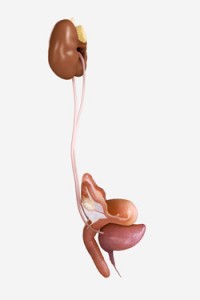In Vietnam, the number of people affected by bladder cancer is increasing every year, but many patients hesitate to seek treatment as they are afraid that surgeons will have to remove their bladder and they’ll have to wear urine collection bags for the rest of their lives. At FVH’s Urology Department, doctors can perform a neobladder reconstruction to help you eliminate these bags. This procedure is considered a revolutionary initiative in helping bladder cancer patients avoid the discomfort of urine collection bags.
Ms. H.P., a 58-year-old patient living in District 8, HCMC, was always a healthy person and she never thought she would be affected by bladder cancer. Even when she noticed her urine became darker with blood clots, she thought that was because her body was becoming “hotter”, so she bought some medicines over the counter to treat these symptoms. Only until she had lower abdominal pain and frequent haematuria did she become worried and seek medical consultation. Test results showed that she had a large tumour in her bladder which had invaded her bladder muscles, and she might have to undergo a complete bladder removal (cystectomy) and even a partial vagina removal (vaginectomy). However, Ms. H.P. was still hesitant to receive treatment because she thought living with two uncomfortable urine collection bags for the rest of her life might be worse than death.
Bladder cancer usually starts in the lining of the bladder – the organ that collects urine filtered by the kidneys. Symptoms of bladder cancer may include dark, brown or bright-red coloured urine, blood clots in the urine, or frequent, painful or difficult urination. These signs are similar to symptoms of other diseases such as bladder stones or urinary tract infections so patients often ignore them and choose not to consult a specialist.

According to Dr. Nguyen Hoang Duc, Head of Urology, FV Hospital: “Most cases of bladder cancer can be detected early through regular health checkups. Early detection and timely surgery can completely cure nearly 80 per cent of bladder cancer cases. Currently, the complete treatment for early-stage bladder cancer is surgery. Transurethral resection (TUR) is often used to remove small tumours without removing the bladder. If the tumour has invaded the muscle layer of the bladder, a radical cystectomy can be recommended in the form of an intra-abdominal laparoscopic surgery or an open surgery, depending on the surgeon’s experience and available facilities.”
Previously, following a cystectomy patients had to wear two urine collection bags for the rest of their lives. However, at FVH’s Urology Department, our doctors can perform a neobladder reconstruction to help you eliminate these bags. This procedure is considered a revolutionary initiative in helping bladder cancer patients avoid the discomfort and offensive odour of urine collection bags.
Dr. Jean-Francois Biset, a French urologist working at FVH’s Urology Department, explains: “After a radical cystectomy, the surgeon will take a section of your small intestine and reshape it into a new bladder (neobladder). “One end of the neobladder is attached to your urethra so that you can urinate normally just like before surgery. In addition, an intra-abdominal laparoscopic radical cystectomy also ensures minimal blood loss, small incisions and fast recovery.”
At FV Hospital, our urologists often perform this surgical procedure at high successful rate.



